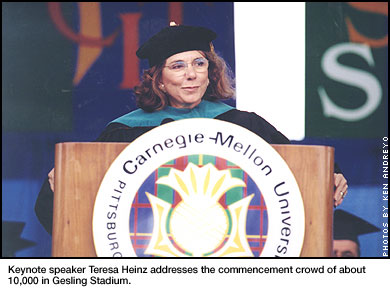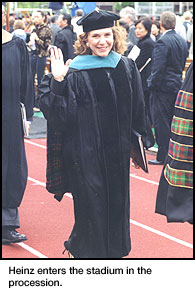|
|
||
|
|
|
 Teresa Heinz Offers Parting Advice for Class of 2003 � Philanthropist Teresa Heinz addressed a crowd of more than 2,500 graduates, their families and friends at the university's 106th Commencement May 18. Her keynote speech, below, encourages graduates to take the spirit of humanity and compassion with them into the world. Thank you for letting me share this special moment in your lives. Over the years, I have heard and delivered enough commencement addresses to know that the most important duty of a commencement speaker is not to overstay her welcome. There is a very old joke about a graduate who was telling his friend about the greatest commencement speech ever. His friend asked, "what was it about?" and the graduate replied, "about five minutes." I hope you will bear with me if I take just a few more minutes than that. Commencement is a rite of passage, which is why these formal ceremonies exist. And they wouldn't be complete without some thoughtful observations. I have to mention how proud I am to share this podium today with my friend and colleague, Jim Walton, and also a friend and fellow Pittsburgher, Paul O'Neill (honorary degree recipients). Paul is a decisive, intelligent man who speaks his mind, and I have always admired that about him. When in Washington, some viewed him as 'too blunt' and 'too outspoken.' Recently, I have shared some of that same attention and it is certainly interesting. But at the end of the day, particularly in an age of much pretense, we have to be true to ourselves. That's what really counts here, and in the hearts of the American people. I think there is something about Pittsburgh that makes for open and honest people. It is a quality that I have always loved about this town, where I came as a young bride in 1966. They are who they are, and they don't pretend to be otherwise.
This is an epic time in history, not just of this country, but also of our world. It is a time that cries out for people to see the world as it really is, in all its complexities. Since The United States has become a military, economic and cultural power the likes of which the world has never seen. Americans can rightly take pride in that fact, and we do. But we must never mistake that power for who we truly are. Long before it became a colossus on the world stage, our nation was known for the spirit of its remarkable people. America is a unique mix of optimism and generosity; a cheerful but unwavering sense that, with enough effort, we can fix any problem, we can right any wrong, we can vanquish any foe. It is a sense of almost limitless possibility, backed up by the kind of grit and determination that are always needed to turn dreams into reality. Everywhere in the world, that spirit has always touched a chord. It touched me, too, as a girl, a young woman, growing up far away in a dictatorship, Mozambique, in east Africa. This country stands for more than the interests of just one people or one nation. America isn't just a country; it is an ideal. It's the legacy of our forefathers who had a vision they thought worth fighting for, and generations since that have each defined citizenship in their own way, all of them also willing to lay down their lives for our concept of freedom. In fact, no nation in human history has given as much of its own treasure to advance that cause. Here, freedom is defined not just by the absence of tyranny, but by our affirmative acts of citizenship. To me, the American spirit at its best, is really just a proxy for the human spirit. It represents the best of what people everywhere hope and pray lies deep inside themselves, in the spirit of their own people and in their own nations. It is the beacon that, throughout its young history, America has offered the world. This is what America has always hoped for, stood for and fought for. If there is any hope for lasting peace and enduring justice, it lies in our ability to create a world in which individuals—not just nations or armies, but citizens acting out of conscience—can shape the future in positive, peaceful and enduring ways. Yes, there are times when history requires a firm hand and the use of power is our only option. Our country has never ducked that duty, and, I believe, we never will. But even in those moments—most especially in those moments—we must remember where that power came from, and what that power is for. It came from the spirit of a compassionate and just people, and it exists to help us protect that spirit and share it with the rest of the world. As you leave here today, graced with a level of education available to only the smallest fraction of the world's citizens, I hope you will think about how to carry that spirit with you. If history is about anything, it is about the persistent struggle between those who would suppress or even oppress the best of human potential—and those who would unleash it. And in this global age, that struggle knows no boundaries. No matter what nation you call home, it will be the defining challenge of your generation. And while we may fight for it at times on the field of battle, the cause will ultimately be lost or won on the field of ideas. And your generation will win it by creating a world where differences in race and culture and religion are accepted and even cherished, where all children are loved and nurtured, where the environment is understood and protected, where human rights are valued and celebrated, and ultimately, where individuals can live their lives in dignity and achieve to the utmost of their abilities. You will win it, in other words, by seeing past the dogmas and borders that divide us and by embracing instead the basic aspirations of mankind that unite us, by the shared dreams that give us our humanity. Make that your fight; make that your struggle. Congratulations, Class of 2003, and congratulations to your families and teachers who along the way have made this day possible. I am sure this university and this city embraced you when you came here and now sends you off with love, with pride in your achievements and with the hope that you will come back to settle down and raise your own families and build your dreams right here in Pittsburgh. Until then, let's just say "so long." Thank you. � �
�
Top�
�
�
�
|
|
This Issue's Headlines || Carnegie Mellon News Home || Carnegie Mellon Home |
||
 In your years here, I hope you have picked up some of that Pittsburgh authenticity, that inner grit and steel—along with a Terrible Towel or two, some trips to see the "Stillers," maybe even a sip of an Iron City and a bite of kielbasa. But along with some distinctive pronunciation and the knowledge that you have gained, it is the true grit that I hope will stay with you as you move on with your lives.
In your years here, I hope you have picked up some of that Pittsburgh authenticity, that inner grit and steel—along with a Terrible Towel or two, some trips to see the "Stillers," maybe even a sip of an Iron City and a bite of kielbasa. But along with some distinctive pronunciation and the knowledge that you have gained, it is the true grit that I hope will stay with you as you move on with your lives.